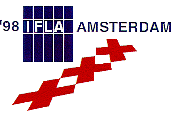
As of 22 April 2009 this website is 'frozen' in time — see the current IFLA websites
This old website and all of its content will stay on as archive – http://archive.ifla.org

As of 22 April 2009 this website is 'frozen' in time — see the current IFLA websites
This old website and all of its content will stay on as archive – http://archive.ifla.org




